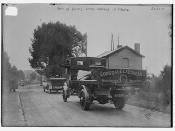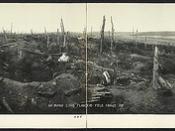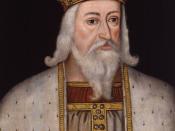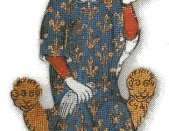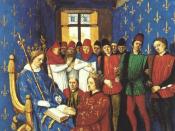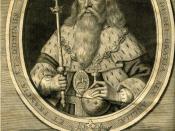By 1300, strong kings created strong centralized nation states if they did not have two factors of the Barraclough?s Thesis working against them at the same time. Geoffrey Barraclough, an English historian, developed six factors that could either make or break a nation state.
The first of the Barraclough?s points is dynastic discontinuity. Dynastic discontinuity results when the reigning king fails to produce a male heir to the thrown at the right time. The bloodline dies out, and a new family comes in and takes over. This happened in Germany when the last Carolingian king, Louis the Child, died in 911 and in France when the last Carolingian king died in 987. Also in France, the Capetians, which started with King Hugh Capet in 987 after the death of the last Carolingian king, produced male heirs for three hundred years. The last three Capetian kings, the sons of Philip IV, the Fair, all died without male heirs and the nearest relative was King Edward III of England, the son of Philip?s daughter.
As a result, Philip of Valois, a first cousin of the previous kings, became king, which eventually caused problems. In 1066, Willie the Bastard conquered England and imposed feudalism-a system of government based on the holding of land in return for forty days service in the field using ?shock warfare.? The next of Barraclough?s points is scattered crown resources. In Germany, the Habsburgs and the Luxemburgs used their position of emperor to increase their personal holdings. Rudolph Habsburg managed to take Austria by conquest from the King of Bohemia and added this territory to the family estates. Charles IV centered his powers in Bohemia, which was a new acquisition of the Luxemburgs. Neither France nor England had any scattered crown resources keeping them much stronger than the German empire.
Barraclough?s next factor is ducal strength. In Germany, the German dukes elected a duke, Henry of Saxony, in 919. Henry and his descendants held the German monarchy until 1024, the most powerful of this line being Otto I, the Great. Also in Germany, the large territorial blocks of Saxony, Franconia, Swabia, and Bavaria became independent political entities under powerful dukes, which were originally districts of the Carolingian empire. In France, King John II granted the huge Duchy of Burgundy to his younger son Philip the Bold in 1363. Philip and his successors greatly enlarged their possessions in eastern France, the Rhone and Rhine valleys, and the lower countries. In England, William the Conqueror had three sons. The eldest boy became the Duke of Normandy, the second became king of England and the third, Henry, was given a cash settlement. After the death of the king, Henry seized the throne and became king and also managed to take over the Duchy of Normandy when his eldest brother died and united it with the kingdom of England.
Another point that Barraclough made was the over-extension of an empire. While Rudolph Habsburg of Germany was successfully adding to his territories, he lost three of the Swiss cantons that were part of his original patrimony. The cantons claimed that they were granted independence under Frederick II. The Habsburgs tried to retake them in 1315 with a large feudal force. Other cantons joined the Swiss patriots because of their success and formed a loose federation of independent cantons and retained their independence. The Capetian kings of France only directly held the area around Paris as their demesne, whereas the English kings controlled the whole country. Powerful dukes and counts controlled large provinces and only were nominally vassals to the king of France. Conquests and marriage alliances seemed to be the only way to unify the territory that presumed to be France.
Having troubles with towns was another factor that was developed by Geoffrey Barraclough. In order to preserve their freedom, Milan and the Lombard towns managed to free themselves of the local bishop, but continually fought with the German emperors. Another problem when towns resorted to violence and was one of the most famous was in Laon. A bishop was found hiding in a wine cask and was brutally murdered when he was found. In 1381, the English Peasant Revolt originated from popular resentment against the policies of the royal government and the practices of the landlords. Peasant bands were enraged by the latest poll tax and marched on London. They demanded for the abolition of serfdom, labor services, and tithes and an end to the poll taxes. After a series of mobs killing the king?s advisors, the king promised the peasants he would give them charters of freedoms. However, the landlords reorganized their forces and violently suppressed the last vestiges of unrest in the countryside. The king, therefore, declared the charters invalid.
The final of Barraclough?s points is troubles with the popes. Frederick II of Germany had to face the increasingly bitter opposition of the popes because Frederick pursued a different policy. As a result, Pope Gregory IX excommunicated him in 1227 because of his failure to lead an eastern crusade. Both Philip IV of France and Edward I of England had been taxing the clergy through the fiction of asking and receiving gifts or money for royal enterprises. In the bull Clericis laicos in 1296, Boniface forbade all clergy to make payments without papal permission. The English simply ignored the order and retaliated by forbidding all exports of coin from his realm to Rome. Boniface issued another bill and condemned Philip directly and then issued Unam Sanctam, which declared that Philip must submit to his authority or risk the damnation of his immortal soul.
Through the formula of Geoffrey Barraclough?s thesis, we can conclude that strong kings emerged in France and England but not in Germany. Three European World Wars resulted: Franco-Presion, World War I and World War II.
